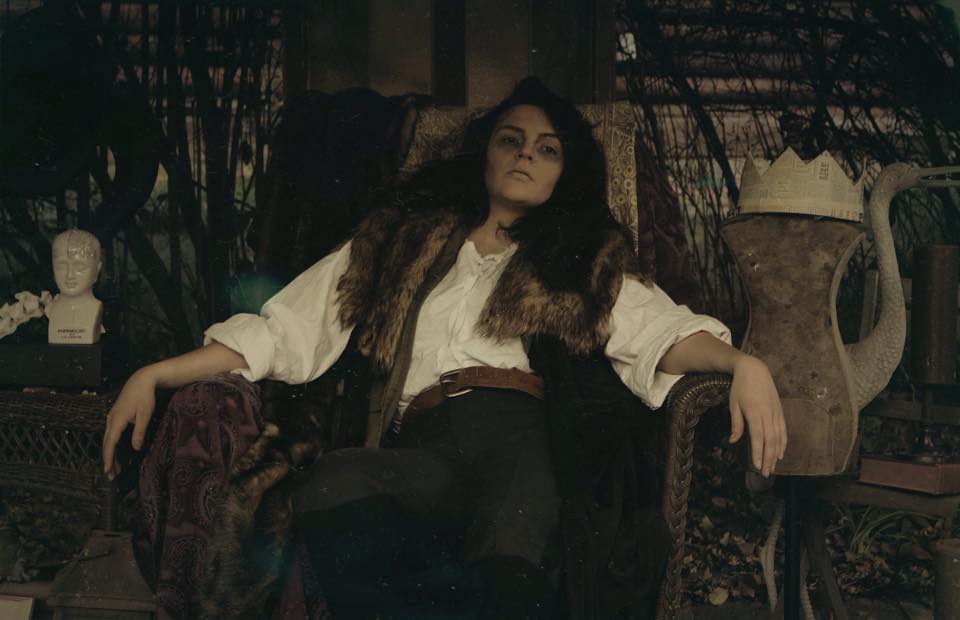PROVO — Minutes after it began to rain during the Grassroots Shakespeare Company production of Macbeth, the young Malcolm (played by Alaynah Woodhouse) was lamenting the chaos that Macbeth had unleashed upon the land, saying, “I think our country sinks beneath the yoke; it weeps . . .” The steady downpour of rain for the rest of the show made it seem like the heavens also wept for Scotland for the rest of the play. The resulting mood emphasized the tragedy and disorder that Shakespeare foresees whenever a wicked king rules over any part of Britain, a recurring motif in his plays.

What made this production of Macbeth unusual, though, was the decision to use cross-gender casting for nearly every major role, an experiment that Grassroots has dabbled in with their all-female Julius Caesar and all-male productions of The Taming of the Shrew and A Midsummer Night’s Dream. In Macbeth the effort is inconsistent in its success. Some actors were very convincing as members of the opposite sex, such as Kat Webb as Macduff and Jordan Kramer as Lady Macbeth. Other performers (such as Emma Robinson as Banquo and Amanda Ruth Wilson as King Duncan) did little to hide their actual gender and instead tried creating a setting where women happened to have traditionally dominant gender roles and men tended to be submissive. Had the cast fully committed to one logic for the cross-gendered casting, then the effort would have been more successful.

In the title role, Toria Truax was suitable as she showed how Macbeth gradually grew more comfortable with obtaining and then holding onto power through murder and violence. I enjoyed how Truax made Macbeth more bold and confident as the play progressed, even though he was haunted (literally) by the ghost of his friend Banquo and the consequences of his actions. Like many of her fellow female cast members, though, Truax never made it clear whether she was playing a man or just a very powerful and violent woman. This also made it harder to believe the relationship that Macbeth had with Lady Macbeth, because Kramer was so good at playing a woman.

Webb created a much more successful performance, who played Macduff with a constant masculine swagger. As a result, it became plausible that Webb’s Macduff would lead an insurrection against a murderous tyrant. Webb had a stage presence that was unmatched by any of her castmates, and by the end of the show I was wishing that she had been cast as Macbeth. The only drawback to her performance was the timid swordfight she had at the end of the play between Macbeth and Macduff, which seemed under-rehearsed and full of trepidation.

I could go through the rest of the cast with similar comments. None of them presented a painful performance, but all had an unevenness that made some moments distinctly better than others. The only other comment that applies to all of the actors was the professionalism and resolve that they had to perform the last act and a half of the play during a driving rain without hesitation. Truly, for the Grassroots Shakespeare Company, the show must go on. Few other companies in Utah would have this much dedication to the art form of live theatre.
But just as particular actors had better moments than others, entire scenes of Macbeth varied in their quality. In general, the more iconic scenes (with the porter, or the witches) were staged in a more engaging way than less memorable scenes (like when Macduff’s family is murdered). Perhaps these scenes are written so strongly that they are easy to execute on stage, or maybe the Grassroots cast understands how important it is to get the most famous scenes right. But the result was that the more plot-driven scenes seemed mechanical. Generally, this Macbeth reminded me of musicals I have seen where the director focused entirely on musical numbers and then treated the dialogue as something unimportant to get through so that the audience can see the next big song. In Macbeth this meant that the cast rushed and skimped over much of the character development in the script in an effort to get to the next murder or witches’ scene.
But where the play succeeds, it does so magnificently. I loved the drumbeats in the third witches’ scene, which emphasized the iambic pentameter of Shakespeare’s poetry. The somber mood as Lady Macbeth and Macbeth deal with the aftermath of Duncan’s murder was superbly eerie, and the audience interaction that Grassroots is famous for has not been eschewed at all. I just wish these moments were more frequent in the play. In my overall summary, though, I go back to Shakespeare’s words: “So fair and foul a day I have not seen.”
[box type=”shadow”]The Grassroots Shakespeare Company production of Macbeth plays every Friday, Saturday, and Monday at 8 PM through October 31 and at 11:55 PM on October 31 at the Castle Amphitheater (1300 E. Center Street, Provo). An additional performance will be October 20 at 1030 South 300 West in Salt Lake City. Tickets are $7-15. For more information, visit www.grassrootsshakespeare.com.[/box]
